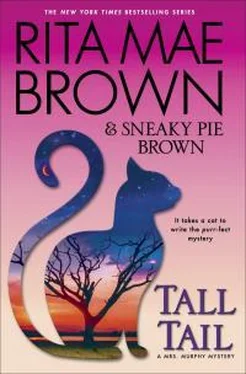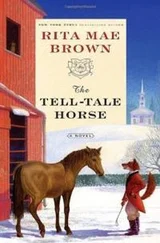“Maybe it was a couple of kids having a destructive or light-fingered moment,” Harry posited. “Remember when every year mailboxes would be smashed by baseball bats? Kids. A couple of them were bored, decide to break in and see what’s there.”
“Right now it’s as good an explanation as any, but I don’t know. The good thing, there have been no other break-ins or attempted robberies. None in Crozet. Not Old Trail, either.”
“I’d be tempted to break into Over the Moon and steal those beautiful notecards and some books, but I like Anne DeVault too much.”
Cooper found driving on I-64 somewhat hypnotic. “Who would have thought a bookstore would succeed?”
Harry defended the little town. “Cooper, Crozet may not be much to look at, but its citizens do read.”
“It’s the old southern story. The money is out on big estates, while the towns not so much.”
“Up until the Industrial Revolution, that was the story everywhere,” said Harry, a history buff. Can you imagine what the country looked like without railroad tracks, paved highways, telephone poles, and electrical poles? Lines hanging overhead. It must have been so beautiful and quiet. I mean, look at this four-lane highway. It could be any four-line highway until you’re on the other side of the Mississippi. Looks different then.” Harry liked the old roads but you couldn’t make good time.
“We live in the twenty-first century. We have no choice but to deal with it,” Cooper sensibly replied.
“People leave,” said Harry. They move far into the country or up into the mountains. We don’t have to live like this.” She paused. “Sometimes I just want to go, like deep into Wyoming or Montana or northern Nevada. Just far away from everything, and then I remember the screen door shutting, Dad walking into the house, or the smell of Mom’s fried okra. I look at the mountains, I inhale the air, and I listen to the redtail hawk. I don’t know as I could go anywhere else.”
“Me, neither. Sometimes I think the opposite of you. I’ll find a job on a big-city force and move up the ranks, more money. Every day will be filled with drama, crimes, people needing help. Like you, I look around and think, ‘Do I really want to be the first woman police chief of Charlotte, North Carolina, or Philadelphia?’ ”
“Speaking of crime, anything new regarding Barbara Leader?”
Cooper shifted in her seat. “How new is new?”
“Coop.” Harry’s voice dropped.
“Yeah, well, a few oddities. Nothing big enough for the media, just oddities.”
“And?”
The tall woman shrugged. “Background footwork. Barbara Leader did her undergraduate work at what was then Randolph-Macon College, which you probably knew. Upon graduating, she was accepted at the University of Virginia’s nursing school, where she excelled. We questioned a few of her professors. She specialized in blood disorders because her younger brother died of leukemia. Everyone we spoke with mentioned her passion for the field, and that’s how she wound up in hematology. Dr. Fishbein also praised her. After fifteen years in the hospital with his blessing and the other doctors’, she switched over to home care. Dr. Fishbein said having someone of Barbara’s caliber in a home nursing situation was uncommon. Usually it’s people who can turn over the patient, give pills or shots, simple stuff like that.”
“I forgot about her brother,” Harry remarked. “He was still in junior high. How wonderful that she specialized in blood diseases.”
“Dr. Fishbein thought Barbara’s care prolonged lives. He said she had an instinct for where the patient was and what he or she needed. And she wasn’t afraid to argue with doctors, especially over medication.” Cooper added, “She really cared.”
Harry remembered her lifeless body in the driver’s seat. “I’m sorry I didn’t know her better.”
“Here’s the thing. She checked out thallium chloride from the hospital. Dr. Fishbein swears he did not prescribe it to anyone. Why would he? But Barbara checked it out, using her initials.”
“You didn’t tell me.”
“Why would I? She signed an old logbook, which she placed in a desk drawer. She didn’t use the computer to enter the information.”
“Coop, that is odd. Maybe she made money selling it.”
“To whom? People don’t abuse thallium chloride. They want Oxycontin and stuff like that. And if she was selling it, why leave her initials in an old logbook?”
“Maybe she really was contemplating suicide.”
“Always a possibility. I can’t count the times when we’ve investigated a suicide and people said, ‘They seemed fine.’ Some people are obviously distressed. Others hid it. Barbara Leader was murdered.”
“What does Rick think?”
“Murdered. The drug results in a swift death. One doesn’t shoot up thallium chloride.”
By the time they reached the outskirts of Richmond, both were still focused on this strange event.
Harry finally said, “What if Barbara took the drug to kill someone else? Maybe a patient in terrible pain.”
“Thought of that, too. She had no record of any suspicious deaths on her watch. Also, her family and friends mentioned she was opposed to assisted suicide. Her husband quoted her as saying ‘God gives life and God takes life, not us.’ ”
“What a moral tangle. Who wants to see someone suffer prolonged intense misery? But it does seem wrong to kill someone. And then I think of battle, especially prior to mechanized warfare, the coup de grace.”
“Maybe this was a coup de grace, unlikely as that seems.” Cooper flicked her fingernails on the passenger window, making a rapid rattling sound.
“She could have taken the drug to hand over to someone else whose spouse or child was suffering.”
“Possible. Either out of compassion or for money.”
“Coop, did she need money?”
“No. She and her husband were not rich but living within their means.”
“That alone is a miracle,” Harry ruefully said. “This is what I think. She lifted the drug. We don’t know why but someone else knew. Either it was for them to put them out of misery or for them to kill someone out of mercy. That person, afraid that she might talk if there’s suspicion, kills her.”
“Possible.”
“We need to find out who knew.”
“Harry.” Cooper raised her voice. “Once we found the evidence everyone in the hematology department knew, as well as Dr. Fishbein’s staff.”
“Let me amend that. Who knew she took it who wasn’t a medical person?” Harry turned off I-95, which she had switched onto as they approached Richmond. She took the Broad Street exit.
“Why are you taking this exit? Ledbury’s is farther downtown on South Fourteenth Street.”
“ ’Cause if I take the Broad Street exit, I know where I am. Richmond used to be easy to drive in. Not anymore,” Harry defended her driving. “Another thought. Maybe Barbara taking the thallium chloride has nothing to do with suffering.”
“Harry, that’s impossible. Why would she or anyone want such a lethal drug?”
“Maybe it is murder, pure and simple.”
“So she knew too much? She was too compassionate to kill someone else. Not the type to assist in murder for reasons which we can’t fathom. Suffering makes more sense.”
“It does, but as you know better than I, murder always makes sense to the murderer. And most murderers believe they will never be caught. Maybe Barbara or her family was threatened. She left evidence that she took the thallium chloride. It wasn’t immediately obvious, but she wanted it known for other reasons. Maybe she left a clue because she feared for her own life.”
Once at Ledbury’s, they opened the door to be greeted by a handsome wire-haired fox terrier.
Читать дальше












